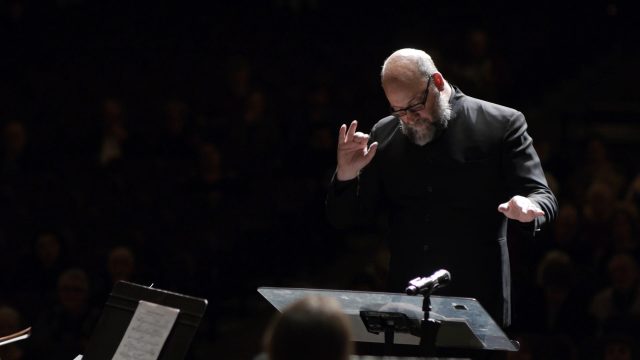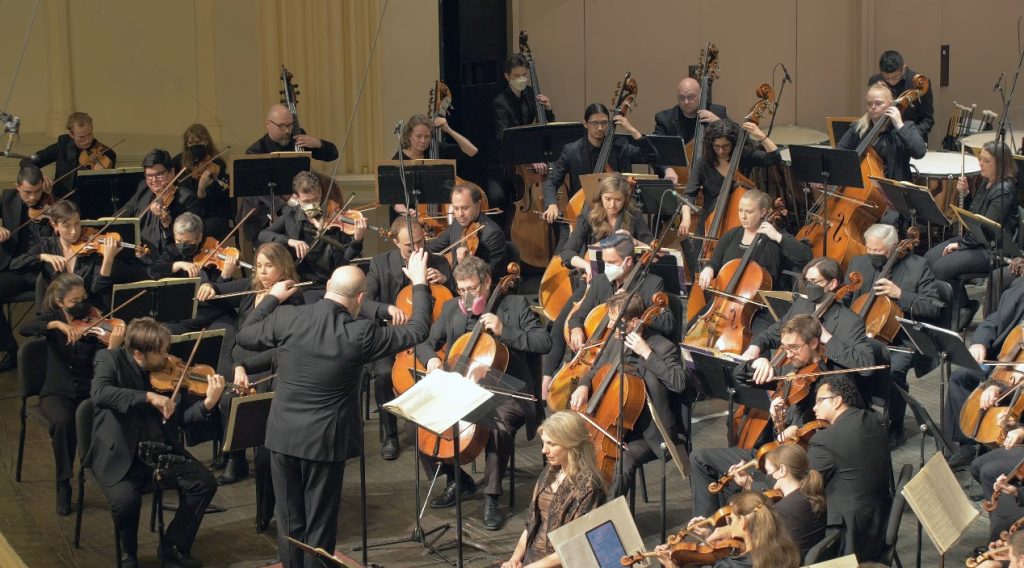
Of the many local performing arts heartaches stemming from the pandemic lockdown, few in the classical world stung quite like the cancellation of Gustav Mahler’s Second Symphony. Now, three years after the plug was pulled on the performance planned for the spring of 2020, Colorado MahlerFest Director Kenneth Woods is ready to finally bring it to the stage during this year’s celebration of the influential Austro-Bohemian composer.
Known as the “Resurrection” Symphony, the work uses one of Mahler’s largest orchestras and concludes with a tremendous choral finale. But when the long-running Boulder festival returned in August 2021, it was more prudent to program the purely orchestral Fifth Symphony. “Now we’re here at last, and it’s going to be worth the wait,” Woods says.
Now returning for its 36th season, MahlerFest XXXVI runs May 17 through 21 at Macky Auditorium and Mountain View United Methodist Church. This year’s offerings have been expanded to five unique concerts, three with orchestra, culminating with the performance of the Second Symphony on the closing Sunday afternoon at Macky Auditorium.
The MahlerFest orchestra will be joined by the full Boulder Chorale, a collaboration Woods describes as “healthy for the community.” MahlerFest Executive Director Ethan Hecht once worked for both organizations. Woods credits him with the collaboration and describes chorale director Vicki Burrichter as “a wonderful colleague,” referring to his work with the group’s women vocalists in last season’s Third Symphony.
Woods will preface the Second with another resurrection-themed work, “Phoenix Rising” by Scottish composer Thea Musgrave — the first woman composer to be featured on a MahlerFest program — which he experienced for the first time two decades ago. “I loved her use of color, her sense of structure,” Woods says. “And I’ve wanted to do it since then.”
For the festival’s other Macky offering on May 20, Woods re-creates a program of Mahler’s orchestral songs conducted by the composer in 1905. “Part of my interest in Mahler is studying his work as a conductor,” he says, noting that few conductors at the time would have been able to do a full evening of their own vocal pieces.
The program includes the Kindertotenlieder and Rückert Lieder cycles to texts by poet Friedrich Rückert, along with seven of Mahler’s settings from the folk collection Des Knaben Wunderhorn. Woods calls it “alien to the typical way we program concerts today.” Under the festival’s previous model of repeating the main concert, he says it would not have been possible.
The orchestral accompaniment is full but intimate, Woods says. “The Second Symphony and the Kindertotenlieder are opposite extremes of Mahler’s aesthetic.”

Reunited (and it feels so good)
The four vocal soloists on the song program will be familiar to returning MahlerFest audience members. Mezzo-soprano Stacey Rishoi and tenor Brennen Guillory sang in Mahler’s “Das Lied von der Erde” in 2018, while soprano April Fredrick and bass Gustav Andreassen took the lead roles in Bartók’s “Duke Bluebeard’s Castle” last year. Rishoi also sang the solo part in last season’s Third Symphony.
This year, Fredrick and Rishoi take the two solo roles in the Second. “It’s lovely to cultivate a sense of old friends coming together,” Woods says.
Andreassen and Rishoi are married, but have not sung with each other at the festival. That changes on the third orchestral program May 17 at Boulder’s Mountain View United Methodist Church. Woods conducts the first act of Richard Wagner’s “The Valkyrie” in a chamber orchestra arrangement by Francis Griffin, an act with only three singers.
Rishoi and Andreassen will sing the parts of dysfunctional married couple Hunding and Sieglinde, while Guillory joins them as Siegfried. Hearing these Wagnerian voices up close in the church will be a “visceral experience,” Woods says.
The operatic excerpt is preceded by the U.S. premiere of the Fourth Symphony by Hans Gál, a composer Woods deeply admires. Written in 1974 when Gál was 84, it is scored for a small, Haydn-size orchestra with a “concertante” group of soloists. “Gál had a wonderful expression and originality of thought,” Woods says, noting that his style resembles Mahler’s in the songs. (A further connection is that Thea Musgrave, featured in the main concert, studied with Gál.)
In contrast to the large-scale grandeur found elsewhere in this year’s program, festivalgoers can expect more intimate offerings from two chamber performances on May 18 and 19 at Mountain View Church. Performers include MahlerFest musicians like concertmaster Zachary DePue and cellist Parry Karp, and local faces such as CU pianist Jennifer Hayghe and clarinetist Daniel Silver.
The first includes a sequence of pieces for solo instruments without piano. “This is as intimate as possible, and a great contrast to Wagnerian opera in the same space,” Woods says.
The second centers on an early work by one of Mahler’s musical heirs, Erich Wolfgang Korngold. He wrote his String Sextet in D Major in 1916 when he was 19 years old, long before the orchestral works and film scores for which he is known.
“It’s a big, ambitious, serious piece,” Woods says. “You can recognize the mature Korngold.”
ON THE BILL: Mahlerfest XXXVI. May 17-21, Macky Auditorium and Mountain View United Methodist Church, Boulder. Full schedule and pricing info at mahlerfest.org.














